Un enfoque de machine learning para la predicción de la calidad de tableros contrachapados
IF 1.5
4区 农林科学
Q3 MATERIALS SCIENCE, PAPER & WOOD
引用次数: 0
Abstract
38 Because of the impact on productivity and cost reduction, decision making in industrial processes is one of 39 the most required aspects in the industry. Specifically in the panel industries, product quality depends on 40 multiple variables, especially wood variability. Among other factors, quality depends on the adhesion of 41 veneers or perpendicular tensile strength. The main objective of this study was to evaluate a Machine 42 Learning approach to predict the adhesion under industrial conditions in the gluing and pre-pressing stage. 43 The control variables that determine this adhesion are mainly: operational times, amount of adhesive, 44 environmental conditions, and veneer temperature. Using Knowledge Discovery in Databases data analytics 45 methodology, Artificial Neural Networks and Support Vector Machine were evaluated. Sigmoid activation 46 function was used with 3 hidden layers and 245 neurons. In addition to the Adam optimizer, Multi-Layer 47 Perceptron, Artificial Neural Networks delivered the best accuracy levels of over 66 %. Best result with Relu 48 and Sigmoid functions were obtained. Sigmoid showed accuracy over 66 %, precision fit good to find 49 positive results (70 %). Relu function obtained the best recall (over 74 %) showing a good capacity to identify 50 reality. Results show that it is not sufficient to generate a data set using the averages of each process variable, 51 since it is difficult to obtain better results with the algorithms evaluated. This work contributes to defining a 52 methodology to be used in plywood plants using industrial data to train and validate Machine Learning 53 models. 54预测胶合板质量的机器学习方法
38 .由于对生产力和降低成本的影响,工业过程中的决策是工业中最需要的方面之一。特别是在板材行业,产品质量取决于40多个变量,尤其是木材的可变性。在其他因素中,质量取决于41单板的附着力或垂直拉伸强度。本研究的主要目的是评估机器42学习方法在工业条件下预测粘合和预压阶段的粘附性。决定这种附着力的控制变量主要有:操作次数、粘合剂用量、环境条件和贴面温度。利用数据库中的知识发现数据分析方法,对人工神经网络和支持向量机进行了评估。Sigmoid激活46函数包含3个隐藏层,245个神经元。除了Adam优化器,多层47感知器,人工神经网络提供了超过66%的最佳准确率水平。使用Relu 48和Sigmoid函数获得最佳效果。Sigmoid的准确率超过66%,其中阳性结果49例(70%),精度拟合良好。Relu函数获得了最好的召回率(超过74%),显示出良好的识别50个现实的能力。结果表明,使用每个过程变量的平均值生成数据集是不够的,51因为使用评估的算法很难获得更好的结果。这项工作有助于定义一种52方法,用于胶合板工厂使用工业数据来训练和验证机器学习53模型。54
本文章由计算机程序翻译,如有差异,请以英文原文为准。
求助全文
约1分钟内获得全文
求助全文
来源期刊

Maderas-ciencia Y Tecnologia
工程技术-材料科学:纸与木材
CiteScore
2.60
自引率
13.30%
发文量
33
审稿时长
>12 weeks
期刊介绍:
Maderas-Cienc Tecnol publishes inedits and original research articles in Spanish and English. The contributions for their publication should be unpublished and the journal is reserved all the rights of reproduction of the content of the same ones. All the articles are subjected to evaluation to the Publishing Committee or external consultants. At least two reviewers under double blind system. Previous acceptance of the Publishing Committee, summaries of thesis of Magíster and Doctorate are also published, technical opinions, revision of books and reports of congresses, related with the Science and the Technology of the Wood. The journal have not articles processing and submission charges.
 求助内容:
求助内容: 应助结果提醒方式:
应助结果提醒方式:


